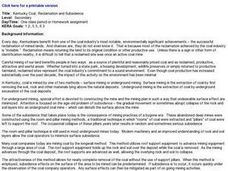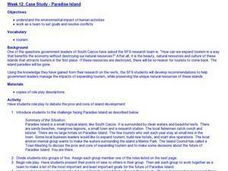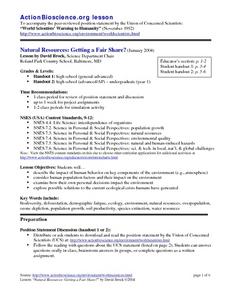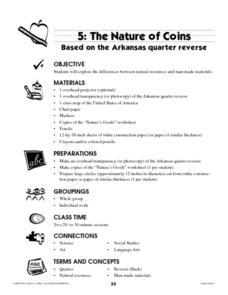Curated OER
How Resourceful Are You?
Pupils investigate the concept of resources. They differentiate between natural, human, and capital resources. Prior to the activity the students need to build background knowledge of goods, services, needs, and wants. They create a...
Curated OER
Renewable vs. Non-Renewable Resources
Fifth graders identify renewable vs. non-renewable resources and comprehend why conservation of resources is important. They are asked what they think the words natural and resource mean. Pupils then put the words together to define...
Curated OER
Where In the World Are the Resources?
Students use the internet to research the amount of natural resources in a specific area on Earth. In groups, they locate the supply of each natural resource on a map in that area and what can be done to reduce their usage. They also...
Curated OER
Activity #9 Extending Oil Well Production
Learners simulate methods used to extend the effective life of an oil well by extracting less available oil. They identify techniques which can be used and evaluate their effectiveness. Pupils are introduced to rock size and temperature...
Curated OER
Sustainability
Fifth graders investigate the concept of natural resources. They participate in a simulation project to see possible uses. They use the internet to study how Hacienda Verde is used as a model for others for sustainable coffee crops.
Curated OER
The More Things Change...
Learners participate in a mock town hall meeting after researching issues relating to fishing rights. After reading The Lorax, they discuss the importance of conserving natural resources. In partners, they write a story of their own...
Curated OER
Natural Resource Awareness
Seventh graders design a collage that shows natural resources or things made from natural resources. They discuss the collages and decide how they use natural resources at home and school. They listen to a read aloud of a Native American...
Curated OER
Recycling
Young scholars investigate how to reduce, recycle, and reuse items in order to conserve natural resources. They complete a trash graphing activity after discussing different types of trash. Finally, the examine ways to buy recycled...
Curated OER
MagLev Train System Activity
Students are able to analyze practices that affect the use, availabiltiy, and management of natural resources. They are able to show that the forces of friction retards motion. Students investigate electricity and magnetism as...
Curated OER
Can You Make It? Using Natural Resources to Survive
Seventh graders describe the natural resources used to make the tools and weapons which best suited the needs of the Cherokee Indians. They will collect information regarding the making of a tool or weapon, and then explain to others...
Curated OER
Kentucky Coal, Reclamation and Subsidence
Young scholars read and discuss the information that they read on the "Kentucky Coal, Reclamation and Subsidence." They then answer questions in reference to the reading. Some questions that students answer are: What is reclamation?,...
Curated OER
Teaching Economics Using LUNCH MONEY
Students, after reading the book "Lunch Money" by Andrew Clements, explore money and different saving places. They research different ways in which productivity has increased over the years, they examine products to determine if the...
Curated OER
Human Activity and the Environment
Students review and analyze graphs and tables as a group. They develop their graph and data analysis skills by converting data tables from Human Activity and the Environment into graphs.
Curated OER
Case Study - Paradise Island
Students make a plan for the future of Paradise Island. Their recommendations should help government leaders manage the impacts of expanding tourism, while preserving the unique natural resources of this island.
Curated OER
The Tragedy of the Commons
Ninth graders participate in a demonstration of the concept of "The Tragedy of the Commons." They conduct a "fishing" simulation demonstrating overfishing, complete two data tables, and answer discussion questions.
Curated OER
Ecology and the Conservation of Natural Resources
Students examine the components of ecosystems. They compare and contrast an ecosystem to an aquatic ecosystem. They examine a local ecosystem and discuss its components.
Curated OER
Ecology and the Conservation of Natural Resources Lesson 2
Students compare and contrast abiotic and biotic factors. They discuss how these factors effect ecosystems. They answer questions to complete the lesson.
Curated OER
Naturally Speaking
Students identify the Earth's natural resources and classify them as renewable or non-renewable. They simulate the distribution of resources and discuss the fairness and effectiveness of the distribution. They identify ways that they use...
Curated OER
Farming: Natural Resources (Lesson 2)
Students identify the types of natural resources. They explain the difference between weather and climate. They practice using a rain gauge and reading a thermometer.
Curated OER
Don't Use it All Up
Students observe the way that a sponge absorbs liquids and discuss how we our use of natural resources affects the environment around us. They discuss the need to conserve resources so we don't run out of what we need.
Curated OER
Natural Resources: Getting a Fair Share?
Students explore the impact of human behavior on key components of the environment, examine how theirn own personal decisions have added to the problem, and explore possible solutions to the current ecological crisis.
Curated OER
Natural Resources
Young scholars use magazines and newspapers to examine the Earth's natural resources. They identify ways that natural resources are protected, threatened, managed and mismanaged. They find the location of each story on a world map and...
Curated OER
The Nature of Coins
Students examine the Arkansas state quarter and identify natural resources depicted on the quarter. They compare natural resources to man-made resources and identify examples of each.
Curated OER
Natural resource Race
Second graders answer true or false questions about natural resources. They stand on lines opposite each other and hop toward the middle if they answered the question correctly.























